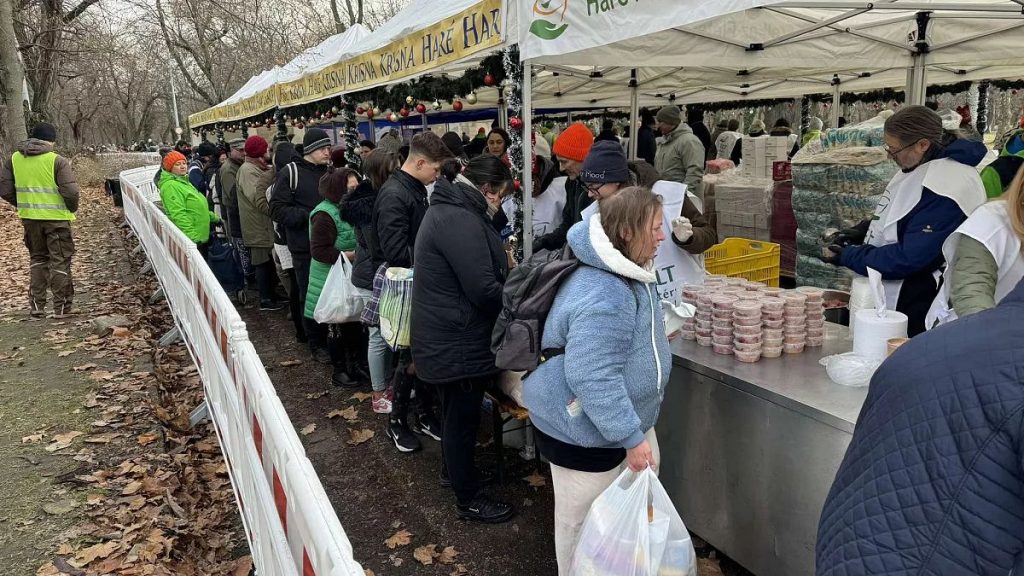The Hungarian Krishna community orchestrated a heartwarming display of compassion and generosity this Christmas season, extending their annual “Food for Life” program to reach an unprecedented number of individuals in need. Their efforts culminated in the distribution of 2,500 hot meals and gift packages on Christmas morning, providing sustenance and a glimmer of hope to a diverse population ranging from the homeless to struggling families grappling with the economic realities of contemporary Hungary. This remarkable feat of charitable giving underscores the growing need for food assistance in the country, a situation exacerbated by the rising cost of living, persistent inflation, and inadequate social safety nets.
The meticulous planning and execution of the Christmas meal distribution involved multiple facets of the community. Volunteers prepared and served traditional Hungarian cabbage stew and warming tea, offering a taste of comfort and holiday cheer. Distribution points were strategically located to maximize reach, with 1,000 meals served directly to residents of local homeless shelters, ensuring that this particularly vulnerable population received immediate support. An additional 1,500 meals were provided at a park in Budapest’s Népliget district, a public space accessible to a broader range of individuals facing food insecurity. This dual approach ensured that both sheltered and unsheltered populations benefited from the Krishna community’s generosity.
The provision of hot meals was further enhanced by the inclusion of small gift packages, each containing a symbol of hope and nourishment in the form of an organic pumpkin grown in the Krishna Valley. This thoughtful addition to the meal distribution demonstrated a commitment to providing not merely sustenance, but also a tangible reminder of the community’s care and concern. The gift packages were further enriched by donations from various contributors, illustrating the collaborative spirit that underpinned the initiative. The outpouring of support extended beyond the Krishna community, encompassing the wider public who contributed to the cause.
Community involvement played a pivotal role in the success of the “Food for Life” program. Shoppers in local supermarkets contributed non-perishable food items such as flour, chocolate, and canned goods, demonstrating the power of collective action in addressing societal challenges. These donations, collected in designated baskets within the supermarkets, provided valuable resources for the Krishna community, allowing them to expand the scope and impact of their charitable efforts. This collaboration between the Krishna community and the general public highlighted the shared responsibility for addressing food insecurity and supporting those in need.
The increasing reliance on food distributions, such as the one organized by the Krishna community, reflects the deepening economic struggles faced by a growing segment of the Hungarian population. The queues for these meals are no longer solely comprised of the chronically homeless, but have expanded to include families once considered middle-class and retirees struggling to make ends meet on fixed incomes. The stark reality of this situation is evident in the willingness of individuals to endure long waits in the cold, driven by the desperate need for a warm meal. This underscores the urgency of addressing the systemic issues contributing to food insecurity and highlights the critical role of community-based initiatives in providing immediate relief.
The “Food for Life” program, extending beyond Christmas Day and continuing through January, underscores the Krishna community’s sustained commitment to alleviating hunger. This extended timeframe of support is particularly crucial following the holiday season, as many other charitable organizations cease their food donations after Christmas Eve. The Krishna community’s continued efforts ensure that vulnerable populations maintain access to vital sustenance during a period when other sources of assistance may be unavailable. Their ongoing commitment bridges the gap in services, providing a lifeline for those struggling to secure basic necessities during the winter months, and exemplifies the true spirit of compassion and service.














